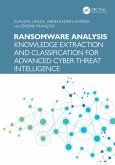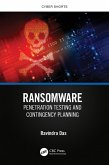Ransomware 3.0 is an emerging threat in which cybercriminals target critical infrastructures and tamper with the data stored on computing devices. Unlike in traditional ransomware attacks, cybercriminals are more interested in the actual data on the victims' devices, particularly from critical enterprises such as government, healthcare, education, defense, and utility providers. State-based cyber actors are more interested in disrupting critical infrastructures rather than seeking financial benefits via cryptocurrency. Additionally, these sophisticated cyber actors are also interested in obtaining trade secrets and gathering confidential information. It is worth noting that the misinformation caused by ransomware attacks can severely impact critical infrastructures and can serve as a primary weapon in information warfare in today's age. In recent events, Russia's invasion of Ukraine led to several countries retaliating against Russia. A ransomware group threatened cyber-attacks on the critical infrastructure of these countries. Experts warned that this could be the most widespread ransomware gang globally and is linked to a trend of Russian hackers supporting the Kremlin's ideology.
Ensuring cyber safety from ransomware attacks has become a national security priority for many nations across the world. The evolving variants of ransomware attacks present a wider and more challenging threat landscape, highlighting the need for collaborative work throughout the entire cyber ecosystem value chain. In response to this evolving threat, a book addressing the challenges associated with ransomware is very timely. This book aims to provide a comprehensive overview of the evolution, trends, techniques, impact on critical infrastructures and national security, countermeasures, and open research directions in this area. It will serve as a valuable source of knowledge on the topic.
Dieser Download kann aus rechtlichen Gründen nur mit Rechnungsadresse in A, B, BG, CY, CZ, D, DK, EW, E, FIN, F, GR, HR, H, IRL, I, LT, L, LR, M, NL, PL, P, R, S, SLO, SK ausgeliefert werden.









